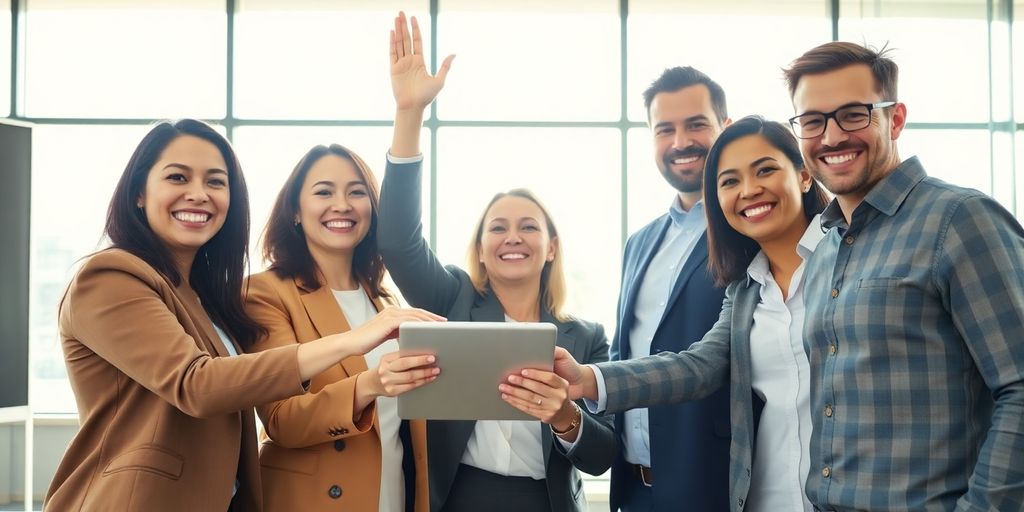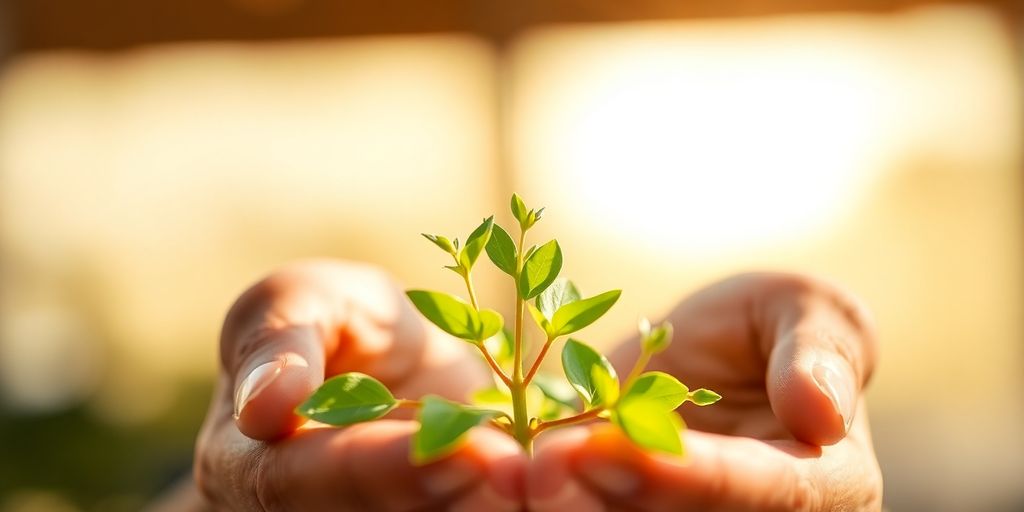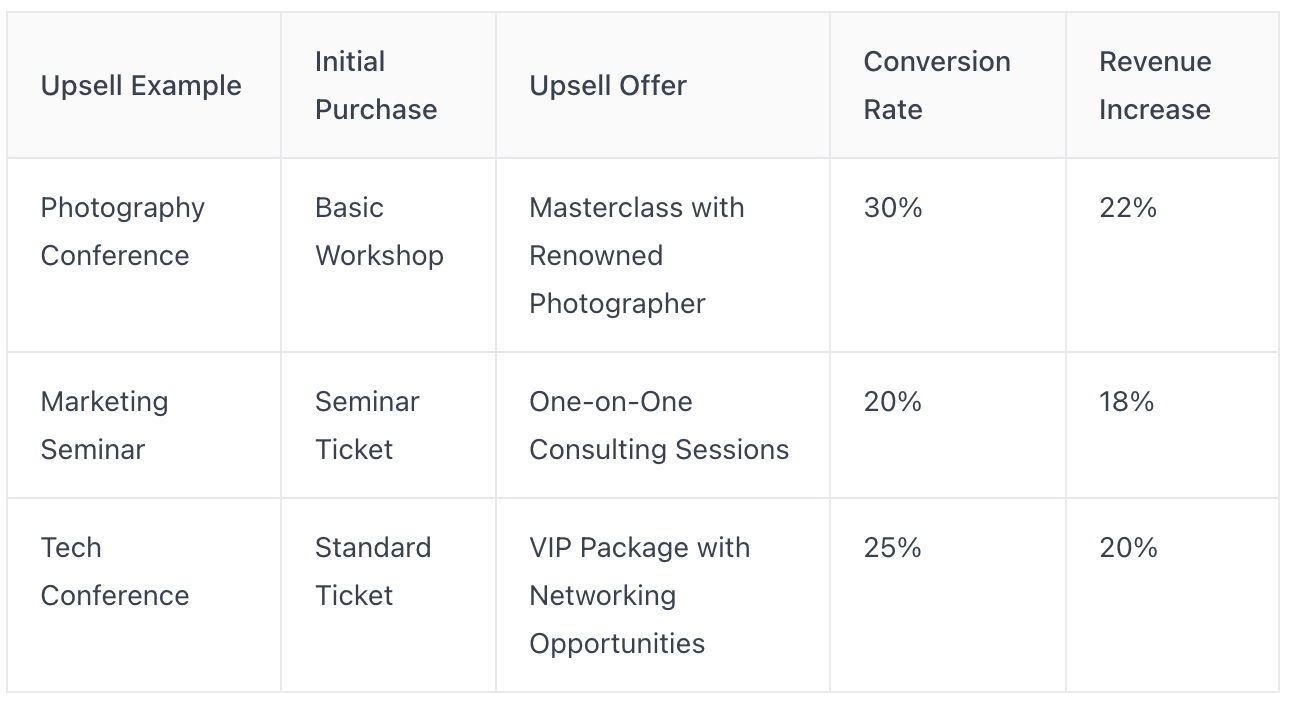Register as an organizer
Click the button below and finish your organizer registration, or fill out the form and we will be in touch to assist you.
.jpeg)
So, the big event is over. Everyone packed up, the lights are off, and the buzz is fading. But guess what? The party doesn't have to end there. This is actually the perfect time to connect with attendees again and offer them something more. We're talking about post-event upselling strategies — turning that one-time interaction into a lasting relationship and, yep, more sales. It's not about being pushy; it's about giving people what they might really want next. Let's dig into how you can do that without feeling weird about it.
Cross-selling at events is like conducting an orchestra – each instrument (or product) needs to harmonize to create a beautiful symphony (customer experience). It's not just about pushing more stuff; it's about making the event better for everyone. When done right, cross-selling boosts revenue and makes attendees happier, eager for the next event.
Think of it like this: what goes well together? The goal is to find products or services that naturally enhance the main event. For example, at a book festival, you could cross-sell signed copies or writing workshops. At a concert, maybe offer official merchandise or early access passes. It's about understanding what attendees are already interested in and providing related options that add value.
Data is your friend. Use it! Look at past attendee behavior to figure out what people might want. Did someone buy a VIP ticket last year? Offer them an even better VIP experience this year. Did they attend a specific workshop? Suggest a related advanced course. Personalization is key. If you know your audience, you can make relevant suggestions that they're more likely to accept.
Timing is everything. Don't wait until after the event to offer a discount on next year's tickets. Do it right after they buy their initial ticket, when they're already excited. Offer a hotel discount immediately after someone registers for an out-of-town event. The closer the offer is to the initial purchase, the more likely people are to take advantage of it. Think of it as striking while the iron is hot. Following up post-event is also important.
Cross-selling isn't about being pushy; it's about anticipating needs and providing solutions. It's about making the event experience more complete and satisfying for attendees. When you focus on adding value, the sales will follow.
Technology is a game-changer when it comes to post-event upselling. It's not just about sending a generic email blast; it's about using the tools at your disposal to create personalized experiences that drive sales. Let's look at how you can make tech work for you.
Setting up automated follow-up sequences is a must. Think of it as a digital sales assistant that works around the clock. You can use email marketing platforms to create a series of messages triggered by specific actions, like attending a particular session or downloading a resource. For example:
AI can take personalization to the next level. By analyzing attendee data, AI algorithms can identify patterns and predict what each individual is most likely to be interested in. This allows you to create highly targeted offers that feel relevant and valuable. Imagine suggesting a specific workshop to someone based on the sessions they attended at the event. It's like reading their mind!
Having a CRM (Customer Relationship Management) system that's integrated with your other event tech is super important. It gives you a 360-degree view of each customer's journey, from initial registration to post-event engagement. This allows you to track their interactions, identify pain points, and tailor your upselling efforts accordingly. With a CRM, you can see what content they've consumed, what emails they've opened, and what purchases they've made. This data is gold when it comes to crafting personalized offers that resonate.
Using technology in this way isn't just about making more sales; it's about building stronger relationships with your customers. By providing them with relevant and valuable offers, you're showing them that you understand their needs and are committed to helping them succeed.

It's easy to overlook the importance of training, but a well-prepared team is essential for successful post-event upselling and cross-selling. You can have the best tech and data, but if your team can't connect with clients and present relevant upsell opportunities, it's all for nothing. Let's look at how to get your team ready.
First, your team needs to really get what the client is trying to achieve. It's not just about selling more stuff; it's about helping the client make their event even better. This starts with active listening and asking the right questions. For example, if a client held a conference focused on sustainability, your team should understand that and tailor any post-event offers accordingly. Maybe suggest a package that includes carbon offsetting for future events or eco-friendly merchandise options. It's about showing you understand their goals.
Your team needs to know the product inside and out. They should be able to answer any question about post-event follow up and explain the benefits of each potential upsell or cross-sell. This means more than just reading a product sheet. Hold regular training sessions where they can try out the products, ask questions, and learn how to position them effectively. Make sure they understand how each product or service can solve a client's specific problem or enhance their future events.
Theory is great, but practice is better. Set up role-playing scenarios where your team can practice their upselling and cross-selling techniques. This helps them get comfortable with different situations and learn how to handle objections. For example, simulate a client who is hesitant to invest in additional services. How does your team respond? What benefits do they highlight? Role-playing helps them refine their approach and build confidence. It's also a good way to identify any gaps in their knowledge or skills.
Training isn't a one-time thing. It's an ongoing process. The event landscape is always changing, and your team needs to stay up-to-date on the latest trends and techniques. Regular training sessions, feedback, and coaching are key to ensuring they're always at their best.

It's easy to get caught up in the excitement of an event and the immediate aftermath, but it's important to take a step back and see if your upselling strategies actually worked. Did they bring in more money? Did customers like the extra stuff they bought? Answering these questions helps you make smarter choices for future events. Without measuring, you're just guessing.
KPIs are your best friends when it comes to measuring success. Here are a few to keep an eye on:
Upselling isn't just about making a quick buck. It's about building relationships and increasing customer lifetime value. Think about it: if someone has a great experience at your event because they upgraded to a VIP package, they're more likely to come back next year and maybe even bring friends.
By tracking how upselling affects customer retention and future spending, you can get a better sense of the long-term ROI of your upselling efforts. It's not just about the money you made at the event; it's about the money you'll make in the future.
Don't just set it and forget it! Create a system for gathering feedback and using it to improve your upselling strategies. This could involve:
Here's an example of how you might track your upselling performance over time:

By consistently tracking these metrics and using feedback to refine your approach, you can turn your post-event upselling into a well-oiled machine.
It's one thing to talk about upselling and cross-selling, but it's another to see it in action. Let's look at some real-world examples where these strategies have paid off big time. These aren't just theoretical wins; they're proof that a well-executed post-event strategy can seriously boost your bottom line and make customers happier.
Think about a photography conference. Attendees initially sign up for basic workshops. But, what if they were offered an exclusive masterclass with a renowned photographer as an upsell? One conference saw a 30% conversion rate on this upsell, resulting in a significant revenue increase. Another example is a marketing seminar where attendees were offered a premium package including one-on-one consulting sessions. The results speak for themselves:

Upselling and cross-selling aren't just about making more money; they're about giving customers a better experience. A music festival, for instance, might offer VIP upgrades that include access to exclusive lounges and better viewing areas. This not only increases revenue but also makes the festival more enjoyable for those who choose the upgrade. Similarly, a cooking class could cross-sell high-quality cookware sets, allowing participants to continue their culinary journey at home with the right tools. This adds value and reinforces the positive experience they had in the class. Follow up post-event is key to maintaining this momentum.
Let's get down to the numbers. How much can you really make from post-event upselling? Here's a breakdown:
One company reported a 15% increase in overall revenue within the quarter following a major event, directly attributed to their post-event upselling efforts. This shows the real potential of a well-planned strategy.
To effectively implement cross-selling strategies, consider the customer's journey and preferences. By tailoring offers to individual needs, you can create a more personalized and rewarding experience. This approach not only drives revenue growth but also fosters stronger customer relationships, leading to long-term success.
The world of post-event sales is changing fast. It's not just about sending a generic email anymore. To really connect with attendees and drive revenue, you need to stay ahead of the curve. Let's look at some of the trends shaping the future of post-event sales.
Forget basic segmentation. The future is all about hyper-personalization. We're talking about using advanced analytics to understand each attendee's individual needs and preferences. Imagine being able to predict what someone wants before they even realize it themselves. This level of insight allows you to craft offers that are incredibly relevant and compelling. For example, if someone attended a session on data insights at a marketing conference, you could offer them a free trial of a data analytics tool or a discount on an advanced course.
People are craving experiences, not just products. Post-event upsells are evolving to reflect this. Instead of simply offering a discount on next year's ticket, think about offering exclusive experiences. This could include:
These types of experiential upsells create lasting memories and build stronger connections with your brand. They also justify a higher price point, boosting your revenue. It's about tailoring offers to individual preferences.
Why limit the engagement to just before and after the event? Subscription models are a great way to keep attendees connected year-round. This could involve offering access to exclusive content, online communities, or monthly webinars. The key is to provide ongoing value that keeps attendees engaged and coming back for more. Think of it as building a community around your event, rather than just hosting a one-time gathering. This also allows for continuous follow up post-event engagement.
The future of post-event sales is about building relationships, not just making transactions. By embracing hyper-personalization, experiential upsells, and subscription models, you can create a loyal customer base and drive sustainable revenue growth.
So, there you have it. Getting good at post-event upsells isn't just about making more money, though that's a nice bonus. It's really about making sure people feel like they got even more out of their experience. When you do it right, you're not just selling them something extra; you're making their whole event experience better. It's about building a connection, making them happy, and getting them excited for whatever you do next. Keep it simple, keep it helpful, and watch your events grow.
Upselling is when you get a customer to buy a more expensive version of something they already want, or to add more features to their purchase. Think of it like going from a regular movie ticket to a VIP one with comfy seats and snacks. Cross-selling is about selling them something related to their first purchase. For example, if they buy a concert ticket, you might offer them a band t-shirt or a special parking pass.
It's super important! When an event ends, people are usually still excited about it. This is the perfect time to offer them more cool stuff or experiences that build on what they just enjoyed. It helps you make more money and keeps customers happy and engaged with your brand.
You can use things like automated emails that go out after the event, special offers shown on your website, or even tools that suggest things based on what a person has bought before. The goal is to make it easy and appealing for them to buy more.
First, make sure your team really understands what the customer wants and what your products or services offer. Then, teach them how to talk about the extra options in a way that sounds helpful, not pushy. Doing practice runs can also help them get good at it.
You should track things like how many people buy extra items, how much more money you make from these sales, and if customers keep coming back for more. This helps you see what's working and what needs to change.
Look for ways to offer super personalized deals based on what each person likes. Also, think about offering unique experiences, not just products. And consider setting up subscription plans so customers keep getting value from you over time.
More blogs
Click the button below and finish your organizer registration, or fill out the form and we will be in touch to assist you.